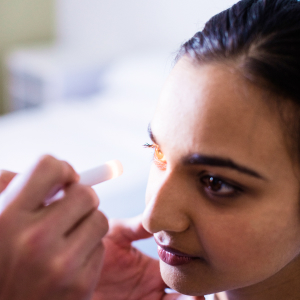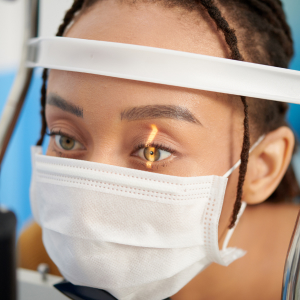- 541-884-3148
- info@klamatheyecenter.com
- 08:00AM to 5:00PM
Retinal Injections
When you get injections in your eye, your eye doctor will:
- Put numbing medicine on your eye to make you more comfortable during the injection
- Clean your eye to help prevent infections
- Put the medicine in your eye with a very small needle and a syringe

Injections don’t change your vision right away. Most people can go back to their normal activities right after the treatment.
You may have short-term side effects, but they should clear up in a day or 2. You may:
- Feel irritation in your eye caused by the antiseptic used to clean it
- See floating air bubbles — which look similar to floaters
Contact your eye doctor right away if you have pain or vision problems that are getting worse after an injection. These could be signs of infection.
Anti-VEGF drugs
In certain eye diseases, the body makes too much of a protein called vascular endothelial growth factor (VEGF), which can cause blood vessels to leak, leading to swelling in the retina (the light-sensitive layer of tissue at the back of the eye). Too much VEGF can also cause blood vessels to grow abnormally, which could damage the eye.
Anti-VEGF drugs block VEGF and can improve vision. Your eye doctor may prescribe anti-VEGF injections if you have:
- Diabetic retinopathy
- Macular edema from various retinovascular diseases, including diabetic macular edema (DME) or vein occlusion, such as CRVO.
- Ocular histoplasmosis syndrome (OHS)
- A type of age-related macular degeneration (AMD) called neovascular or “wet” AMD

Medicines called anti-VEGF drugs block this protein and help improve vision. Common anti-VEGF drugs include:
- Avastin (bevacizumab)
- Lucentis (ranibizumab)
- Eylea (aflibercept)
- Beovu (brolucizumab)
- Vabysmo (faricimab)
Most people who get anti-VEGF injections will need injections once a month at first. Over time, you may need injections less often. Some people can eventually stop getting the injections, but others need to keep getting injections to protect their vision.
Steroids
To test for glaucoma, a disease that can cause blindness when too much pressure in your eye damages the optic nerve, your eye doctor will use a tonometer to measure your intraocular pressure.
If you have macular edema, DME, uveitis, or another eye disease that causes swelling in the retina or inflammation in the eye, your doctor may suggest a medicine called a steroid as a treatment. Steroids can help reduce swelling and inflammation.
Common steroid injections include:
- Triesence (triamcinolone acetonide)
- Kenalog (triamcinolone acetonide)
Other ways to take steroids for eye conditions
People often take steroids as injections or eye drops — or your doctor can put a special device called an implant in your eye. The implant gives you constant small doses of the medicine over time. If you get the implant, you may be able to stop getting monthly steroid injections.
Common steroid implants include:
- Ozurdex (dexamethasone) for short-term use
- Iluvien and Yutiq (fluocinolone acetonide) for long-term use
Steroids can increase your risk for cataracts and glaucoma. If you take steroids to treat an eye disease or another health condition, it’s important to get regular eye exams to check for signs of these problems.

